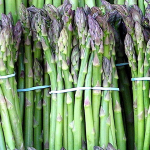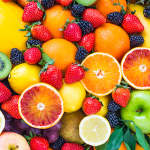America eats a lot of potatoes, well over 100 pounds per person annually. According to Harvard’s School of Public Health, a potato is not to be considered a vegetable. What up with that?
vegetables
Why is asparagine, a rather boring molecule that biology majors are forced to memorize, grabbing international headlines? It can be found foods containing protein – which are many – including asparagus, the vegetable after which it was named. But some in the media say it causes cancer, which means asparagus causes cancer. (We're not kidding.)
Spring is just around the corner, and with it comes another growing season. Eating a diet rich in fruits and vegetables can help lower calorie intake; reduce risks for heart disease, obesity and Type 2 diabetes; and protect against certain cancers.
With all these benefits, why do some consumers choose to avoid produce? Approximately three-quarters of people in the U.S. don’t eat enough fruits and vegetables, according to the 2015 Dietary Guidelines for Americans.
Flummoxed parents have had many a sleepless night trying to figure out how to get their kids to regularly eat fruits and vegetables. While some will stand firm in their resolve to be convincing, there's another group of parents that believes providing incentives -- critics would call it bribery -- is an effective way to get kids to eat more healthfully.
When it comes to using microwave ovens, all the usual suspects line up to attack the appliance. The fountain of misinformation, Joe Mercola warns it kills more people than cigarettes and asbestos. Natural news, which is run by Mike Adams (who makes Mercola seem like Louis Pasteur) claims that everything from obesity to erectile dysfunction is
For years the Environmental Working Group (EWG) has been publishing its lists of vegetables and fruits that supposedly are contaminated with the largest amounts of pesticides.



